In today’s rapidly evolving tech landscape, the roles of cloud engineers and software engineers have emerged as pivotal components of the digital realm. While these two professions often overlap in their skill sets, they each bring distinct expertise to the table. This article delves into the nuanced disparities between cloud engineers and software engineers, shedding light on their core responsibilities, tools, and the domains they operate in.
We will explore how cloud engineers specialize in managing and optimizing cloud infrastructure, while software engineers focus on developing applications and software solutions. Understanding these differences is crucial for individuals seeking career paths in the IT industry and organizations looking to harness the full potential of cloud technologies and software development.
What Is a Cloud Engineer:
Definition
Cloud engineers often work with popular cloud service providers like Amazon Web Services (AWS), Microsoft Azure, and Google Cloud to create scalable, secure, and highly available systems.

Responsibilities:
Cloud Architecture Design
Cloud engineers are tasked with creating robust and scalable cloud architectures that align with an organization’s specific needs. They design solutions that optimize resource utilization and cost-effectiveness while ensuring high availability and security.
Implementation and Deployment
Once the architecture is designed, cloud engineers are responsible for implementing and deploying the infrastructure. This involves setting up virtual machines, configuring networks, and integrating various cloud services.
Security and Compliance
Maintaining the security and compliance of cloud environments is paramount. Cloud engineers implement security best practices and ensure that data and applications are protected against potential threats.
Performance Optimization
Cloud engineers continuously monitor system performance and make necessary adjustments to optimize resource utilization. This includes load balancing, auto-scaling, and fine-tuning to ensure efficient operation.
Disaster Recovery and Backup
They design and implement robust disaster recovery plans and backup strategies to minimize downtime and data loss in the event of system failures or disasters.
Troubleshooting and Support
When issues arise, cloud engineers are responsible for diagnosing and resolving problems promptly. They provide technical support to ensure that the cloud infrastructure runs smoothly.
Automation
Automation is a key aspect of cloud engineering. Engineers use tools like Infrastructure as Code (IaC) to automate infrastructure provisioning and management tasks, making the process more efficient and less error-prone.
Education and Certification Paths
To pursue a career as a cloud engineer, individuals typically need a strong educational foundation in computer science, information technology, or a related field. Relevant degrees include computer science, computer engineering, or IT management. In addition to formal education, certifications play a crucial role in enhancing one’s qualifications [2].
Some of the most sought-after certifications for cloud engineers include:
- AWS Certified Solutions Architect
Offered by Amazon Web Services, this certification validates the ability to design and deploy scalable, highly available, and fault-tolerant systems on AWS.
- Microsoft Certified: Azure Solutions Architect
This certification from Microsoft focuses on designing solutions that run on Azure, covering aspects such as infrastructure, networking, security, and data storage.
- Google Cloud Professional Cloud Architect
Google Cloud’s certification assesses the ability to design and manage Google Cloud solutions while ensuring reliability and security.

- Certified Cloud Security Professional (CCSP)
This certification, offered by (ISC)², emphasizes cloud security and provides cloud engineers with the knowledge and skills required to secure cloud environments effectively.
- Certified Information Systems Security Professional (CISSP)
While not specific to cloud engineering, CISSP is highly regarded in the field of information security and can be beneficial for cloud engineers responsible for securing cloud infrastructure.
Career Prospects
The role of a cloud engineer is in high demand, reflecting the increasing reliance on cloud technology across industries. As businesses migrate to the cloud to reduce costs and enhance scalability, the need for skilled cloud engineers continues to grow. Cloud engineers can find employment in various sectors, including finance, healthcare, e-commerce, and more.
Additionally, they can work for cloud service providers or as freelance consultants. Salaries for cloud engineers are competitive, with experienced professionals often earning well above the industry average.
What Is a Software Engineer:
Definition
Software engineers play a pivotal role in the entire software development lifecycle, from conception and design to coding, testing, and ongoing maintenance.
Responsibilities:
- Software Design and Architecture
Software engineers are responsible for creating the architectural blueprint of software systems. They decide how the different components of a software application will interact and function together.
- Coding and Programming
Writing, testing, and debugging code is a fundamental part of a software engineer’s role. They use various programming languages and tools to implement the software according to the design.
- Testing and Quality Assurance
Software engineers are accountable for ensuring the software works as intended. They conduct rigorous testing and quality assurance procedures to identify and fix bugs or issues.
- Collaboration
Software engineers frequently collaborate with cross-functional teams, including designers, product managers, and quality assurance professionals, to ensure the successful development of a software product.
- Maintenance and Updates
After software deployment, engineers remain involved in maintaining and updating the software to accommodate evolving requirements, address security vulnerabilities, and introduce new features.
- Documentation
They document the software’s codebase, making it easier for other team members to understand and modify the software when necessary [4].
- Problem Solving
Software engineers are often required to solve complex technical challenges and optimize the performance and efficiency of software systems.

Education and Certification Paths
A bachelor’s degree in computer science, software engineering, or a related field is the traditional educational path for aspiring software engineers. However, the industry is known for valuing practical experience and skills over formal education. Consequently, many successful software engineers are self-taught or have completed coding bootcamps and online courses.
In addition to a formal education, certifications can enhance a software engineer’s qualifications and marketability.
Some widely recognized certifications for software engineers include:
- Certified Software Development Professional (CSDP)
The CSDP certification, offered by the IEEE Computer Society, validates a software engineer’s knowledge and expertise in software development.
- Certified ScrumMaster (CSM)
This certification focuses on the Agile project management methodology and is beneficial for software engineers working in Agile development environments.
- Microsoft Certified: Azure Developer Associate
For software engineers developing applications on Microsoft Azure, this certification demonstrates proficiency in Azure-related development tasks [5].
- AWS Certified Developer – Associate
For software engineers working with Amazon Web Services, this certification validates their ability to develop and maintain applications on AWS.
- Certified Information Systems Security Professional (CISSP)
While primarily a cybersecurity certification, CISSP can be advantageous for software engineers involved in secure software development and coding practices.
Career Prospects
The demand for software engineers remains consistently high, given the pervasive role of software in today’s digital world. Opportunities for software engineers exist across industries, including technology, healthcare, finance, and entertainment. Startups, large corporations, and government agencies all rely on software engineers to create innovative solutions and improve their operations.
The flexibility of this profession allows software engineers to specialize in areas such as mobile app development, web development, game development, or backend systems. The job market is also favorable to freelance and remote work, offering developers the freedom to work on projects from different locations.
Differences Between Cloud Engineers And Software Engineers:
Tasks
Cloud Engineers
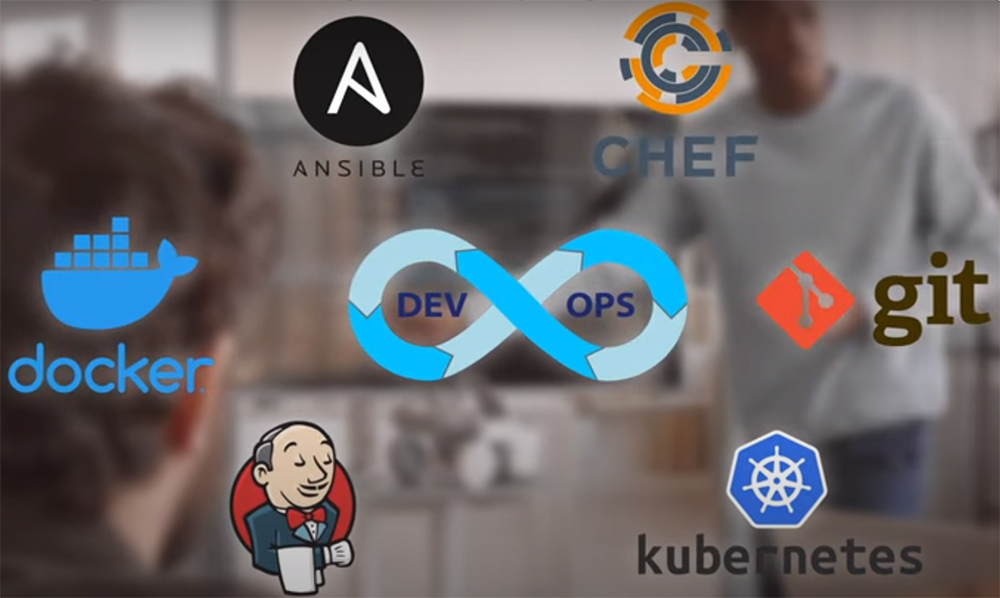
Cloud Engineers are primarily responsible for designing, implementing, and maintaining cloud infrastructure. They work with various cloud service providers like AWS, Azure, Google Cloud, and others to ensure that an organization’s data and applications are securely hosted in the cloud. Their tasks often include configuring virtual machines, setting up databases, managing storage, and optimizing cloud resources for cost-effectiveness.
Cloud Engineers also need to have expertise in networking, security, and scalability. They focus on creating a robust and resilient cloud environment, ensuring high availability, disaster recovery, and efficient resource utilization.
Software Engineers
Software Engineers, on the other hand, are primarily focused on designing, developing, and maintaining software applications. They write code, test software, and collaborate with other team members to create functional and efficient software solutions. Their tasks can vary widely depending on the specific role, but they often include coding, debugging, and ensuring the software aligns with the project’s goals.
Software Engineers typically work on applications that may run on various platforms, from mobile devices to desktop computers, and may be involved in front-end development, back-end development, or full-stack development, depending on their specialization.
Positions
Cloud Engineers
Cloud Engineers can hold various positions within an organization, such as Cloud Architect, Cloud Administrator, DevOps Engineer, or even specialized roles like Cloud Security Engineer or Cloud Solutions Architect. These positions reflect the diverse skill set and knowledge base required for cloud engineering.
Software Engineers

Software Engineers also have a wide range of positions to choose from, including but not limited to Front-End Developer, Back-End Developer, Full-Stack Developer, Mobile App Developer, and Quality Assurance Engineer. The specific title often corresponds to the type of software they work on and the technologies they use [7].
Certifications
Cloud Engineers
To excel in the world of cloud engineering, certifications play a pivotal role. Popular cloud certifications include AWS Certified Solutions Architect, Microsoft Certified: Azure Administrator, Google Cloud Professional Cloud Architect, and more. These certifications validate the skills and knowledge necessary to work with specific cloud platforms. Many organizations require or prefer their Cloud Engineers to hold relevant certifications as proof of their expertise.
Software Engineers
Software Engineers typically do not require specific certifications to practice their profession. While there are certifications available in programming languages, such as Oracle Certified Java Programmer or Microsoft Certified: Azure Developer, these are not as commonly expected or essential as they are for Cloud Engineers. Instead, the focus for Software Engineers is on building a strong portfolio of projects and continually improving their coding skills.
Skills
Cloud Engineers
Soft skills like problem-solving, critical thinking, and effective communication are also vital for Cloud Engineers, as they often work in cross-functional teams and need to address complex technical challenges.
Software Engineers
Software Engineers require proficiency in programming languages, such as Python, Java, C++, or JavaScript, depending on their chosen field. They must be skilled in software development methodologies, version control systems, and debugging tools. Additionally, they should be familiar with front-end and back-end technologies, databases, and web development frameworks.

Software Engineers also need excellent problem-solving abilities and strong teamwork skills, as they collaborate with designers, product managers, and other stakeholders to bring a software project to fruition.
Job Duties
Cloud Engineers
Cloud Engineers are responsible for the design and maintenance of cloud infrastructure. They create virtual networks, configure security settings, and optimize resource allocation. They monitor cloud resources for performance, security, and cost efficiency. In the event of any issues or outages, Cloud Engineers are tasked with troubleshooting and implementing solutions.
In addition to these tasks, Cloud Engineers may be responsible for disaster recovery planning, creating backup strategies, and ensuring compliance with industry-specific regulations [8].
Software Engineers
Software Engineers are primarily focused on developing and maintaining software applications. Their duties often involve coding, testing, and debugging. They collaborate with product managers to define requirements and work closely with other team members to integrate their code with the larger project.
Software Engineers may also be responsible for optimizing software for performance and scalability, ensuring that applications run smoothly and efficiently.
Job Requirements
Cloud Engineers
To become a Cloud Engineer, a bachelor’s degree in computer science, information technology, or a related field is often required, along with relevant certifications. Employers typically look for candidates with experience in cloud platforms and a strong background in network and system administration. It’s common for Cloud Engineers to have a few years of experience in IT before specializing in cloud technologies.
Software Engineers
Software Engineers generally require a bachelor’s degree in computer science or a related field. While formal education is essential, employers also value experience and a strong portfolio of projects. Soft skills like problem-solving, creativity, and the ability to work in teams are highly regarded in the software engineering field.
Salary
The salary for both Cloud Engineers and Software Engineers can vary widely based on factors like location, experience, and the specific industry or company.
Cloud Engineers
Software Engineers
Software Engineers also enjoy competitive salaries, with variations based on location and specialization. Entry-level Software Engineers typically earn around $60,000 to $90,000 per year, while experienced professionals can earn six-figure salaries. Senior Software Engineers and those in leadership roles may see their annual income exceed $150,000 or more.
In conclusion, while both Cloud Engineers and Software Engineers play critical roles in the technology industry, they have distinct tasks, positions, certification requirements, skill sets, job duties, and job requirements. The choice between these two career paths depends on an individual’s interests, strengths, and career goals. Regardless of the path chosen, both professions offer promising opportunities for growth and financial rewards in the rapidly evolving world of technology.
Similarities Between Cloud And Software Engineers:
Educational Requirements
Cloud Engineers
A bachelor’s degree in computer science, information technology, or a related field is often a standard educational requirement for Cloud Engineers. This educational background provides a solid foundation in computer science principles and technology.
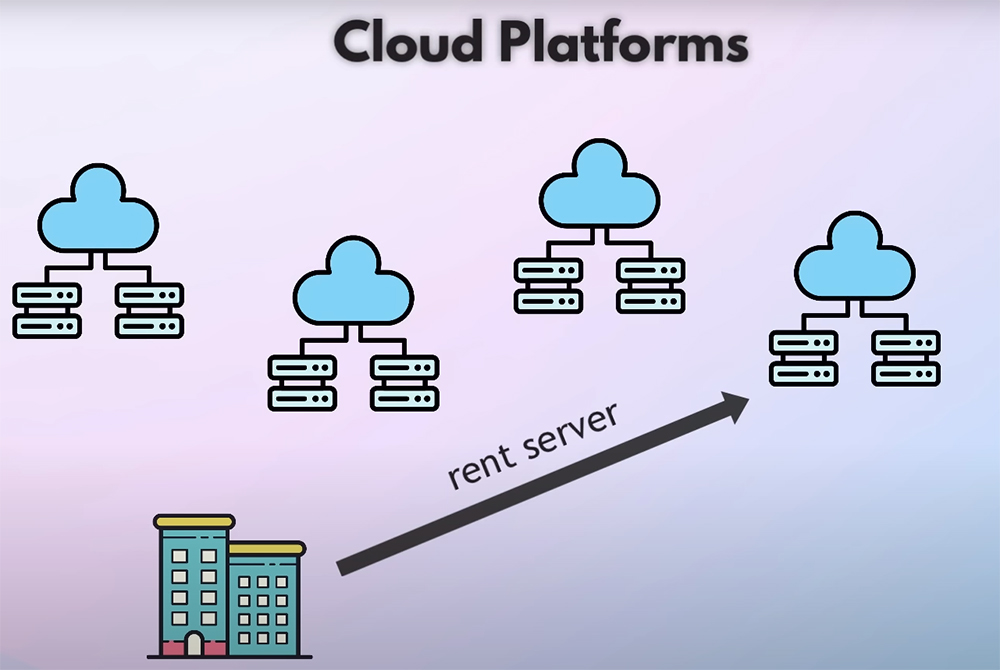
While formal education is essential, the technology landscape is ever-evolving, and Cloud Engineers often need to engage in continuous learning. They frequently pursue certifications specific to cloud platforms, such as AWS, Azure, or Google Cloud, to demonstrate their expertise.
Cloud Engineers may also benefit from advanced degrees or specialized training in areas like cloud security, networking, or containerization technologies [9].
Software Engineers
Similar to Cloud Engineers, Software Engineers typically require a bachelor’s degree in computer science or a related field. This educational background equips them with a strong understanding of programming, algorithms, and software development principles.
While formal education is a foundation, Software Engineers also need to keep up with advancements in programming languages, frameworks, and development methodologies. Continuous learning is a fundamental aspect of the software engineering profession.
Specialized certifications in specific programming languages or development tools can enhance a Software Engineer’s qualifications, although they are not as standard or essential as in cloud engineering.
In summary, both Cloud Engineers and Software Engineers share the educational requirement of a bachelor’s degree in a relevant field and the need for ongoing learning and skill development to stay current in their respective domains.
Work Environments
Cloud Engineers
Cloud Engineers can work in a variety of settings, depending on the organization’s needs. They may be employed by technology companies, cloud service providers, government agencies, or any business with a significant cloud infrastructure.
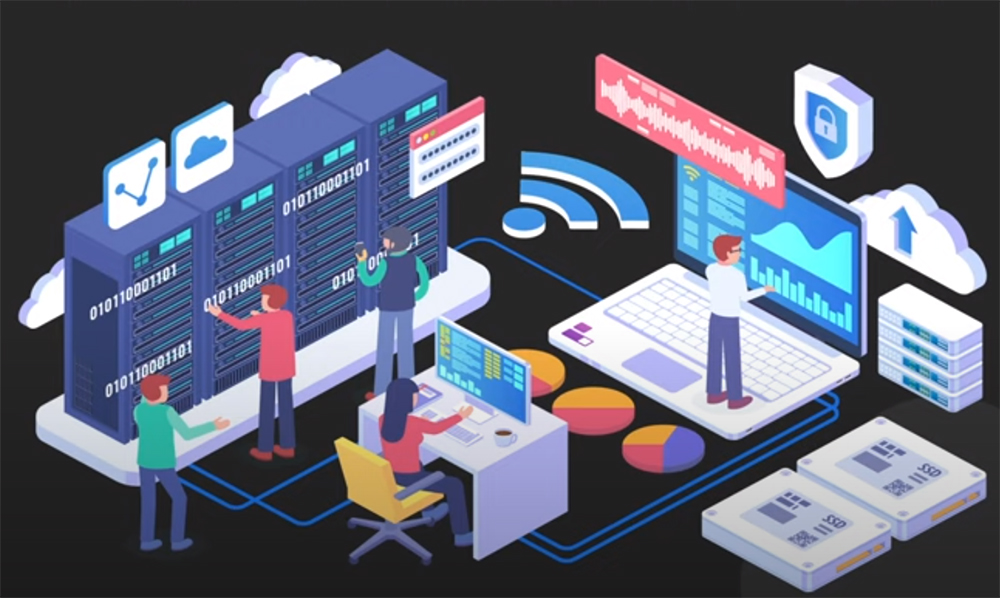
Cloud Engineers often work in collaborative environments, frequently interacting with other IT professionals, such as network administrators, system administrators, and security specialists.
They may also engage in remote work, as cloud infrastructure management can be performed from anywhere with an internet connection.
Software Engineers
Software Engineers enjoy a diverse range of work environments. They can be found in tech companies, startups, financial institutions, healthcare organizations, and virtually any industry that requires software development.
Collaboration is a key aspect of software development, and Software Engineers often work closely with product managers, designers, quality assurance teams, and other developers.
Like Cloud Engineers, Software Engineers can take advantage of remote work opportunities, as software development tools and collaboration platforms make it possible to work from various locations.
In both cases, professionals in these roles have the flexibility to adapt to different work environments and collaborate with various teams, whether on-site or remotely. The adaptability of their skills and the widespread demand for their expertise provide them with a wide array of career opportunities.
Cloud Engineer vs. Software Engineer: Which Is Right For You?
Is Cloud Engineering for You?
Consider a career as a Cloud Engineer if you:
- Enjoy Infrastructure Management: If you have an interest in designing, building, and managing cloud infrastructure, including virtual machines, databases, and networking, then cloud engineering may be your calling;
- Have Strong Problem-Solving Skills: Cloud Engineers frequently tackle complex problems related to cloud architecture, scalability, and security. If you’re a problem solver, this role will challenge and reward you;
- Love Learning About Cloud Technologies: The cloud industry evolves rapidly, and Cloud Engineers must stay up-to-date with the latest cloud services and best practices;
- Are Security-Conscious: Security is a significant aspect of cloud engineering. If you’re passionate about safeguarding data and applications in the cloud, this role may be ideal;
- Pursue Certifications: Cloud Engineers often pursue certifications specific to cloud providers (e.g., AWS, Azure, Google Cloud) to validate their expertise;
Is Software Engineering for You?
Consider a career as a Software Engineer if you:
- Have a Passion for Coding: Software Engineers are primarily responsible for developing software applications. If you enjoy writing code and solving software-related challenges, this role aligns with your interests;
- Creative Problem Solver: Building software solutions often involves creativity and innovation to design user-friendly and efficient applications;
- Diverse Specializations: Software Engineering offers various specializations, from front-end development to back-end development, mobile app development, data science, and more. You can choose a specialization that matches your interests;
- Love Continuous Learning: The software field evolves with the introduction of new programming languages, frameworks, and tools. Continuous learning is essential to stay competitive;
- Team Player: Collaboration is key in software development. You’ll work closely with designers, product managers, and quality assurance teams to create successful projects;
FAQ:
-
Is a cloud engineer the same as a software engineer?
No, Cloud Engineers and Software Engineers are not the same. While both roles are closely related to the field of information technology, they have distinct responsibilities. Cloud Engineers focus on designing, building, and maintaining cloud infrastructure and services. They manage cloud resources, ensure scalability, and optimize cloud environments for efficiency.
Software Engineers, on the other hand, primarily write code to develop software applications, including web and mobile apps. They are responsible for designing, coding, testing, and maintaining software.
-
Can a software engineer work as a cloud engineer?
Yes, a Software Engineer can transition into a role as a Cloud Engineer, but it typically involves learning additional skills and knowledge. Many of the core skills of a Software Engineer, such as programming, problem-solving, and logical thinking, are transferable.
However, to become a Cloud Engineer, a Software Engineer would need to gain expertise in cloud platforms, infrastructure management, networking, and security. This may involve pursuing cloud-related certifications and gaining experience in cloud technologies.
-
Does a cloud engineer need coding?
Cloud Engineers do not need to be expert software developers, but they often need basic coding and scripting skills. Coding is useful for automating cloud-related tasks, such as provisioning resources, managing configurations, and setting up deployment pipelines. While the depth of coding knowledge required may vary depending on the specific role, familiarity with scripting languages like Python, Bash, or PowerShell can be valuable for a Cloud Engineer.
-
What language do cloud engineers code?
Cloud Engineers typically use scripting languages like Python, Bash, or PowerShell for automating tasks and managing cloud resources. They may also use Infrastructure as Code (IaC) tools like Terraform or AWS CloudFormation, which involve writing code to define and provision cloud resources. The choice of programming language depends on the cloud platform and tools being used.
-
Is a cloud engineer a DevOps?
A Cloud Engineer can work in a DevOps role, but they are not the same. DevOps is a culture and set of practices that aim to automate and integrate the processes of software development and IT operations. While Cloud Engineers often play a significant role in implementing DevOps practices by managing cloud infrastructure, DevOps Engineers have a broader focus on automating the entire software development lifecycle, from coding to testing, deployment, and monitoring. A Cloud Engineer may specialize in infrastructure automation within the context of DevOps practices.
-
Does cloud engineering have a future?
Yes, cloud engineering has a bright future. The adoption of cloud computing continues to grow across various industries, and organizations are increasingly relying on cloud services to improve flexibility, scalability, and cost efficiency. As long as businesses continue to migrate to the cloud and leverage cloud technologies, the demand for Cloud Engineers is expected to remain strong.
-
Is a cloud engineer a hard job?
The difficulty of being a Cloud Engineer can vary depending on your background, the specific role, and the complexity of the cloud environment you work with. Cloud engineering can be challenging because it involves managing complex infrastructure, ensuring security, optimizing performance, and staying current with rapidly evolving cloud technologies. However, with the right education, training, and experience, it is a rewarding and achievable career.
-
Do cloud engineers get paid more than software engineers?
Salaries for Cloud Engineers and Software Engineers can vary widely based on factors like location, experience, and the specific employer. In general, Cloud Engineers tend to command competitive salaries due to their specialized knowledge in cloud technologies. Entry-level Cloud Engineers may earn salaries similar to those of entry-level Software Engineers, but with experience and expertise, Cloud Engineers may see their income surpass that of Software Engineers, particularly in specialized roles.
-
Can anyone be a cloud engineer?
Becoming a Cloud Engineer typically requires a strong foundation in IT, computer science, or related fields. While anyone with the required skills and knowledge can pursue this career, it often involves formal education, certifications, and hands-on experience in areas such as networking, infrastructure management, and cloud technology. Those willing to invest in learning and gaining relevant expertise can transition into the role of a Cloud Engineer.
-
How stressful is a cloud engineer career?
The stress level of a Cloud Engineer’s career can vary depending on factors such as the organization’s size, the complexity of the cloud infrastructure, and the level of responsibility. Cloud Engineers may face stress during high-demand periods, such as system outages or when implementing critical updates. However, effective planning, automation, and proactive maintenance can help reduce stress. Additionally, having problem-solving skills and a strong support network can mitigate the pressures of the job.
-
Are cloud engineers in demand as of 2023?
As of 2023, Cloud Engineers continue to be in high demand. The ongoing shift to cloud computing, hybrid cloud environments, and the need for cloud-native solutions have created a persistent need for professionals with expertise in cloud architecture, infrastructure management, and security. Organizations across various industries are actively seeking Cloud Engineers to support their digital transformation and cloud adoption efforts.
-
How much do cloud engineers make at Google?
Salaries for Cloud Engineers at Google can vary depending on factors like experience, location, and specific job role. As of 2023, Cloud Engineers at Google could expect competitive salaries, often in the six-figure range. For the most accurate and up-to-date salary information, it is advisable to refer to Google’s official job listings or consult salary surveys and market data specific to your region.
-
What is the salary of a 4-year cloud engineer?
The salary of a 4-year experienced Cloud Engineer can vary significantly based on factors like location, industry, and specialization. In the United States, for instance, a Cloud Engineer with four years of experience can expect an annual salary in the range of $90,000 to $140,000, but this can be higher or lower depending on the factors mentioned earlier.
-
Which pays more – cloud or data science?
Salaries in the fields of Cloud Engineering and Data Science can be competitive, but the earning potential can differ based on various factors. Data Science often involves advanced statistical and machine learning skills, which can lead to higher salaries in certain cases. However, both fields offer rewarding compensation, and the choice between them should be guided by your interests, skills, and career aspirations rather than solely by potential earnings.
-
Is Cloud Engineering still in demand?
Yes, cloud engineering remains in high demand. The widespread adoption of cloud computing across industries, coupled with the ongoing need for cloud infrastructure management, security, and optimization, ensures a continued demand for Cloud Engineers. As businesses increasingly rely on cloud services to enhance their operations and digital transformation, professionals with cloud expertise will continue to be sought after in the job market.
Useful Video: Software Engineering vs Cloud Engineering – Which Is Better for Entry Level?
References:
- https://bestaccreditedcolleges.org/articles/cloud-engineer-vs-software-engineer.html
- https://in.indeed.com/career-advice/finding-a-job/cloud-engineer-vs-software-engineer
- https://climbtheladder.com/cloud-engineer-vs-software-engineer/
- https://www.danylkoweb.com/Blog/whats-the-difference-between-a-software-engineer-and-a-cloud-engineer-a-quick-breakdown-SG
- https://www.reddit.com/r/cscareerquestionsCAD/comments/wc9ras/cloud_engineer_vs_software_engineer_job_prospects/
- https://developerpitstop.com/cloud-engineer-vs-software-engineer-unraveling-the-differences/
- https://itsourcecode.com/blogs/cloud-engineer-vs-software-engineer-what-path-for-you/
- https://www.computercareers.org/cloud-engineer-vs-software-engineer-which-is-for-you/
- https://stackoverflow.blog/2023/04/10/whats-the-difference-between-software-engineering-and-computer-science-degrees/





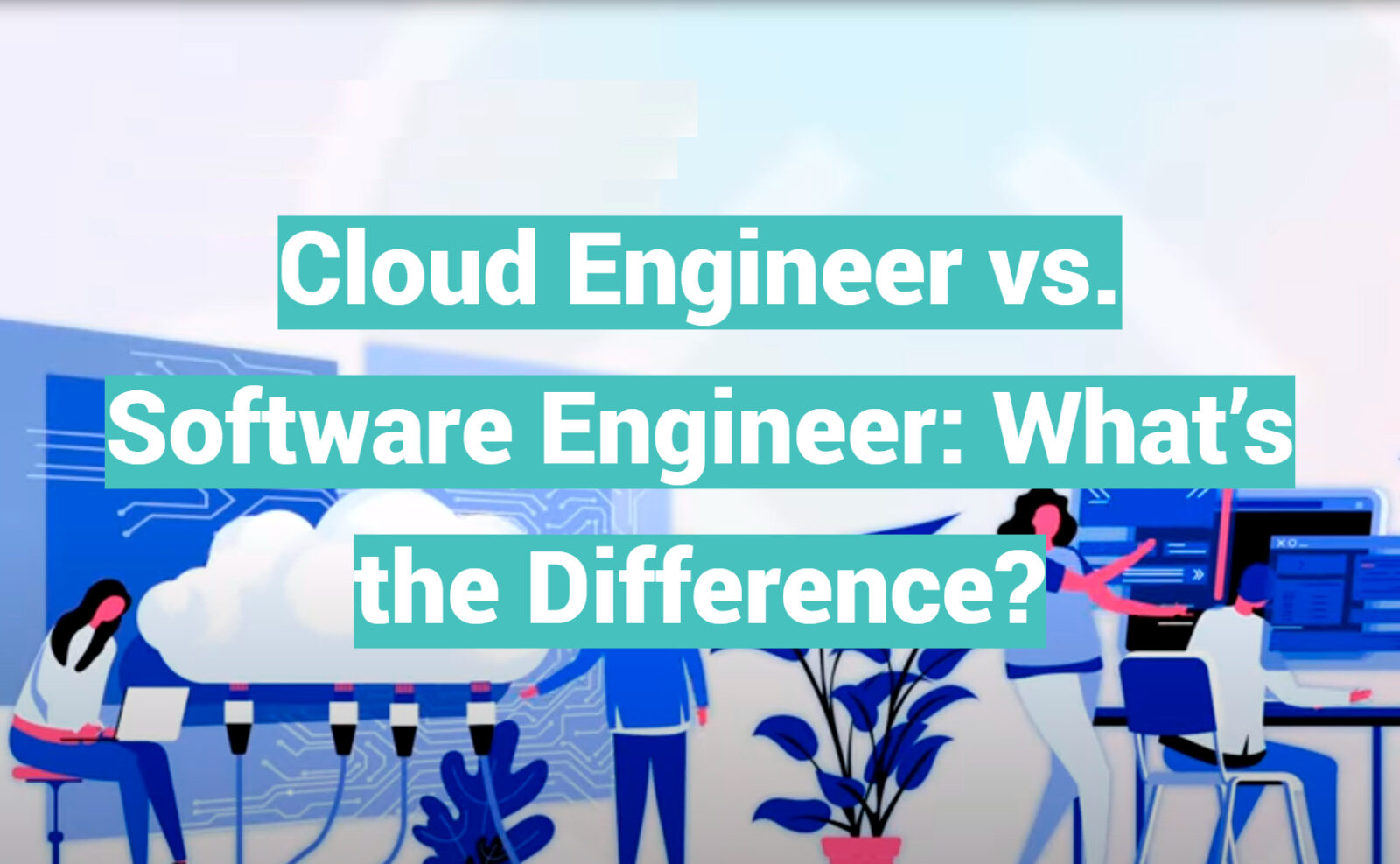
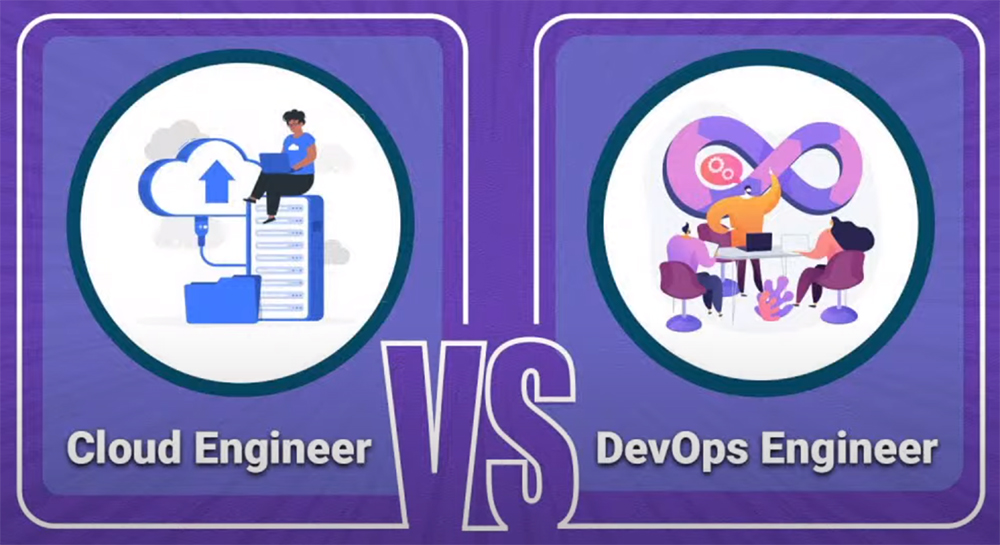



Leave a Review